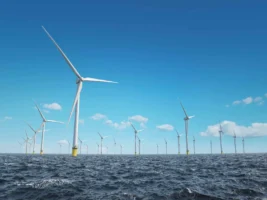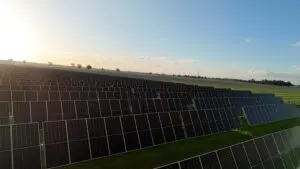 The Australian Capital Territory is to trial its first “gas-free” suburb as part of the next step in its push for 100 per cent renewable energy in the nation’s capital.
The Australian Capital Territory is to trial its first “gas-free” suburb as part of the next step in its push for 100 per cent renewable energy in the nation’s capital.
The ACT is expected by 2020 to have commissioned enough wind and solar farms to reach the equivalent of 100 per cent renewable energy for its electricity supply, now it wants to turn its attention to another major fossil fuel – gas.
The new master-planned Ginninderry development will trial a gas-free residential precinct in stage 1 of the suburb. It will affect the first 350 homes.
Rather than being connected to the gas-grid, each home will include mandatory solar panels and smart meters, and be equipped with efficient electric heating and cooling, and induction cooktops.
The government expects the switch to electric appliances will save households $14,000 over the life of the equipment.
“As the ACT moves to 100 per cent renewable electricity by 2020, gas will become one of the major remaining contributors to greenhouse gas pollution, so we will need to find options to reduce gas use,” says Shane Rattenbury, the Greens MLA who is minister for climate and sustainability.
Gininderry is a joint venture between the ACT government and local landowners, mostly farmers, who want to make it an “exemplar” of sustainable development.
Local planning rules make it compulsory for gas to be connected to new housing divisions, along with other “essential services”, but the ACT government gave a waiver after an approach from developers, the Riverview Group.
Rattenbury says the push-back from the gas industry, when it got wind of the move, was fierce. But he expects it will not be the last request of this type.
“Once we show it is possible, we are quite confident it will be the way of the future,” Rattenbury told RenewEconomy.
Data released earlier this week by the ACT government shows the amount of gas being consumed by ACT households is already falling, at a much faster rate than the states, mostly due to the choice of efficient electric appliances and the widespread installation of rooftop solar.
The report shows average annual household gas consumption has dropped 22 per cent since 2010 and 13 per cent since 2015 – from 50 gigajoules in 2010, to 45 gigajoules in 2015, and 39 gigajoules in 2017.
The number of households connected to gas fell from 70 per cent in 2010 to 67.9 per cent in 2014, and the number of households using gas for space heating fell from 60 per cent in 2011 to 45 per cent in 2014.
“This shows that ACT residents are being smarter with their gas consumption, and are making the switch to move away from gas altogether,” Rattenbury said.
“People are using more energy efficient gas appliances, taking energy efficiency actions like draught proofing their houses or switching to electrical appliances.”
“The report shows a clear downward trend in household gas consumption, with the ACT way out in front of other jurisdictions in the race to reduce gas use,” Rattenbury said.
“This is very good news as gas contributes significantly to greenhouse gas emissions and we are moving towards a zero net emissions territory by 2050 at the latest.”










